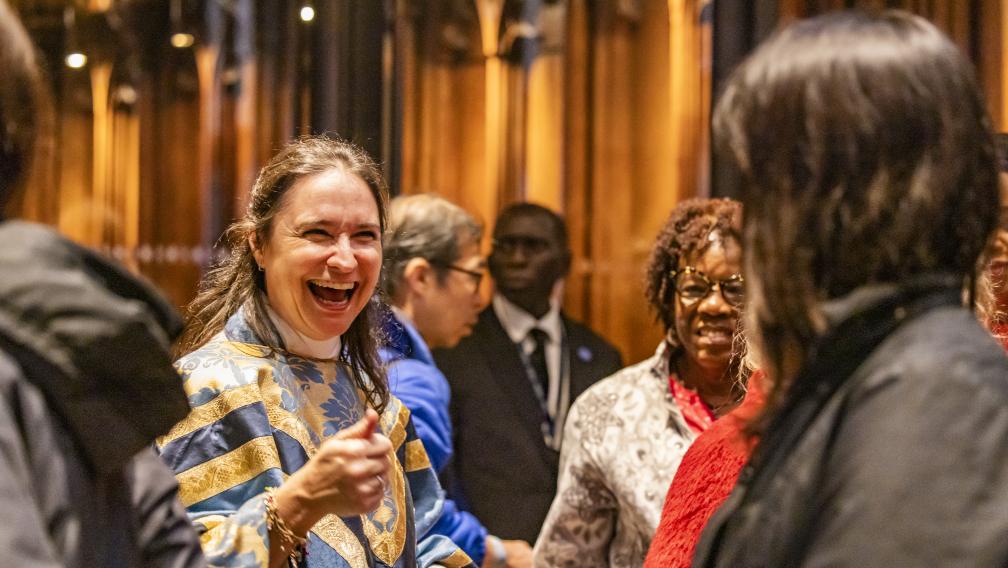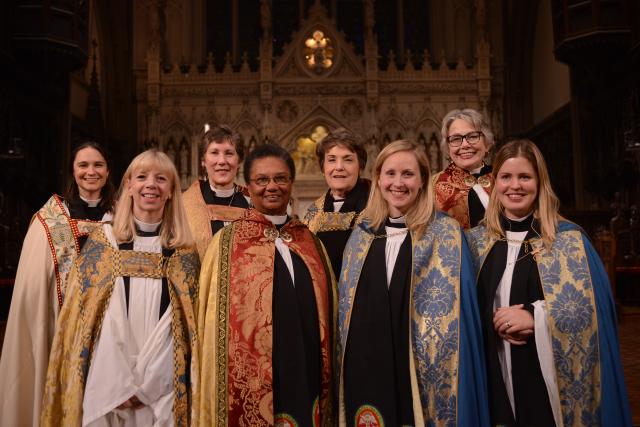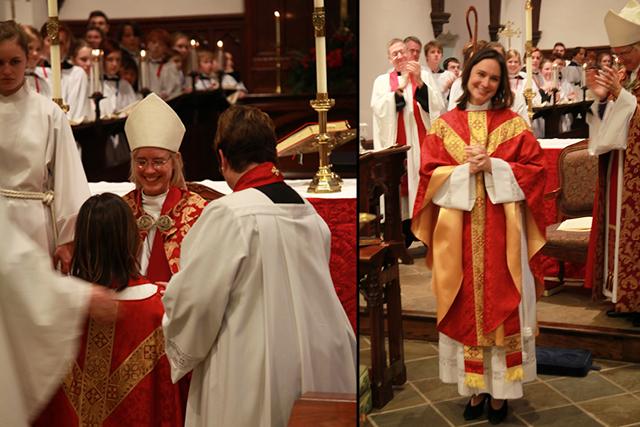The Rev. Kristin Miles Reflects on 50 Years of Women’s Ordination

Fifty years ago, on July 29, 1974, eleven women were ordained as Episcopal priests at Philadelphia’s Church of the Advocate. These trailblazers, who came to be called the “Philadelphia Eleven,” paved the way for the churchwide approval of women’s ordination two years later.
The Rev. Kristin Kaulbach Miles, Trinity Church’s newly named Director of Parish Life, said without the courage and faithfulness of the Philadelphia Eleven, she wouldn’t be where she is today — preaching from the pulpit, celebrating communion, and serving God’s people.
“People have come up to me and touched my vestments in tears because they’ve never seen a woman priest before,” Mother Kristin said. “Such moments prompt all of us to think about our gifts and how we are asked to serve. This anniversary means it’s possible for me to live out my own calling.”
People have come up to me and touched my vestments in tears because they’ve never seen a woman priest before.
the Rev. Kristin Kaulbach Miles
In 1970 and 1973, resolutions supporting women’s ordination failed to pass at the General Convention, The Episcopal Church’s governing body. Growing restless, the Philadelphia Eleven were ordained by three retired bishops, sparking immediate controversy. The ordinations were deemed invalid until 1977, when The Episcopal Church began affirming women priests.
Since then, many more women have followed the call to the priesthood. Roughly 40% of active clergy in The Episcopal Church are women and 30% of Episcopal bishops are women. A total of 19 ordained women have served Trinity Church. The first woman to be ordained at Trinity was the Rev. Anita Schell-Lambert, who became a priest in 1984. Trinity’s first female vicar was the Rev. Anne Mallonee, who served from 2004 to 2014.
We recently spoke with Mother Kristin about what this anniversary means to her, the moment she realized she wanted to be a priest, and the hope she has for the next 50 years.
When did you first hear about the Philadelphia Eleven?
In divinity school, women who were priests and professors shared stories about the struggle for women’s ordination and the sense of camaraderie and power that came from that struggle. In one of my classes, I even got the chance to hear directly from the Rev. Dr. Carter Heywood, one of the Philadelphia Eleven. It showed me what is possible when a group of committed people perseveres to make a change.
Fifty years is a milestone, but it’s also not that long ago. Why do you think women’s ordination took so long to achieve?
I think there’s a lot of fear — fear of change. Tradition offers security, even as it binds and sometimes holds things too tightly. But without getting beyond our fears and biases, we can’t flourish.
What does it mean for women to be able to step into that role now?
It shows us the importance of welcoming everyone to the table. All tables are sacred — from the kitchen table to the coffee table to the altar. If we limit who is invited to the table, we’re limiting the healing, camaraderie, and nourishment we all need.
When did you first imagine yourself as a priest?
While doing hospital chaplaincy, I saw how meaningful the sacraments were to the people I met. There were moments in the hospital when a need arose for forgiveness or confession, receiving anointing, receiving communion. I realized I wanted to be able to offer all these components of God’s love, and I started to think about ordination.
Did you have any role models?
I’m grateful for the Rev. Ellen Huber, the priest who supported and guided my ordination process. Her ministry was warm, grounded, smart, and effective. She knit together a community, not just in our church but in our town. She was a mother who raised her children while serving as a priest. She gave me a sense of what could be possible and I wanted to join her in that work.
What’s giving you hope right now?
I’ve raised three boys in The Episcopal Church. When my oldest son was little, we were at this church with a priest who is a woman. He asked me, “Mom, can boys be priests, too?” And I said, “Yes, yes, they can!” That was a beautiful moment that showed me how powerful it is, who stands at the altar, and how much of a journey it’s been across these decades.
How will women priests change The Episcopal Church over the next 50 years?
Change comes from all of us. We need more people who are empowered to add their voices and lend their hands to the work that needs to be done. There’s a line in the book of Esther that says, in essence, “Who knows, perhaps you have come to your power for such a time as this.” There is work for all of us in such a time as this.
Responses have been edited for length and clarity.







